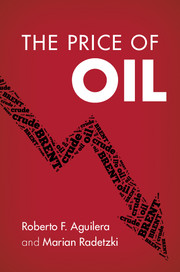Book contents
- Frontmatter
- Contents
- Figures
- Tables
- Acknowledgments
- 1 Introduction and overview
- PART I OIL'S EXTRAORDINARY PRICE HISTORY: HOW CAN IT BE EXPLAINED?
- PART II THE SHALE AND CONVENTIONAL OIL REVOLUTIONS: LOW PRICES AHEAD
- PART III GLOBAL IMPLICATIONS FOR THE MACROECONOMY, THE ENVIRONMENT AND FOR POLITICS
- CONCLUSIONS
- 16 What have we learned?
- References
- Index
16 - What have we learned?
from CONCLUSIONS
Published online by Cambridge University Press: 05 November 2015
- Frontmatter
- Contents
- Figures
- Tables
- Acknowledgments
- 1 Introduction and overview
- PART I OIL'S EXTRAORDINARY PRICE HISTORY: HOW CAN IT BE EXPLAINED?
- PART II THE SHALE AND CONVENTIONAL OIL REVOLUTIONS: LOW PRICES AHEAD
- PART III GLOBAL IMPLICATIONS FOR THE MACROECONOMY, THE ENVIRONMENT AND FOR POLITICS
- CONCLUSIONS
- 16 What have we learned?
- References
- Index
Summary
This short, concluding chapter sums up the main lessons learned from our earlier deliberations. Some of the findings arising from the analysis are quite spectacular, and, we must admit, have come as a surprise even to ourselves. Yet, we feel that they emerge from fairly cautious assumptions and reasonable methodologies.
The major takeaways in focus pertain to depletion versus the power of technology and human inventiveness, the ability of politics to spoil even the best of circumstances, the shale and conventional oil revolutions’ link with climate policy, and the fallacy of being unduly tied to the present when attempting to accurately forecast the future.
DEPLETION IS NOT A FUNDAMENTAL FORCE
One lesson that has come out forcefully, not only during our work with the present book, but throughout our career-long efforts to come to grips with the economics of natural resources, is that depletion, in the sense of inadequate resources preventing output expansion or raising costs and prices to the extent that demand shrinks, is a chimera.
Depletion is a mentally appealing concept; after all, the availability of an exhaustible resource is by definition limited, so exhaustion is eventually inevitable, and we have encountered serious difficulties in convincing our student audiences when lecturing at our universities of an alternative point of view. It seems to us that humanity has a deeply rooted need for prophetic visions of an impending doomsday, an attitude that is very difficult to overcome, for it appears to be a survival mechanism hardwired into the human psyche. Forms of doomsday have varied over history, but the calamities following from depletion of natural resources (physical as well as environmental), such as described by the Club of Rome (Meadows et al., 1972) or by the Peak Oil adherents (e.g., Campbell, 1997; Aleklett, 2012), have perhaps dominated the doomsday gospel over the most recent 100 years.
In our research on natural resource economics, we cannot quote any instances of an exhaustible resource material that has been depleted in the sense defined above. In contrast, we can quote a number of cases where formerly valuable resources with apparently limited availability have become worthless for a variety of reasons, and so still remain unexploited.
- Type
- Chapter
- Information
- The Price of Oil , pp. 213 - 220Publisher: Cambridge University PressPrint publication year: 2015



